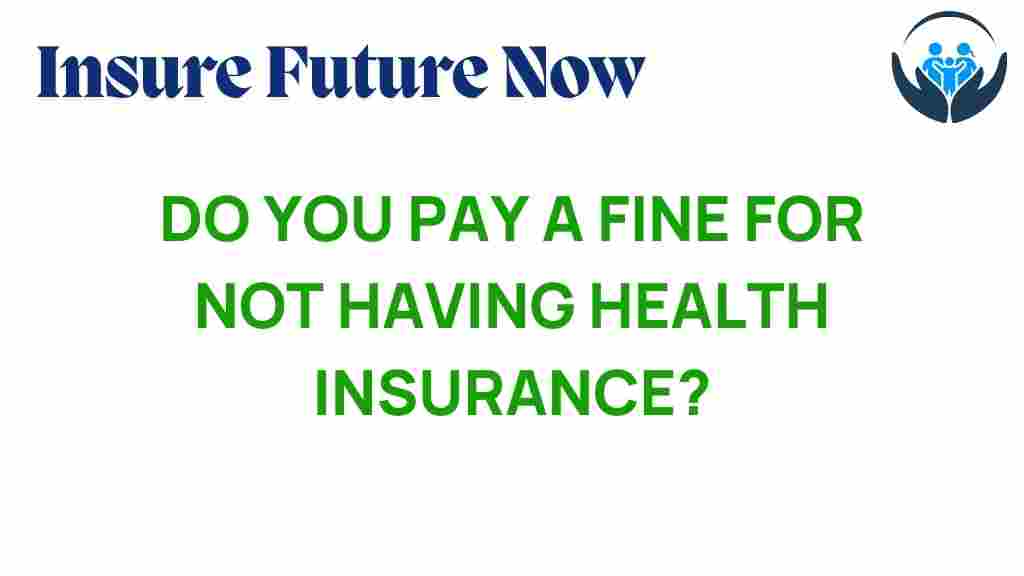Uncovering the Truth: Do You Pay a Fine for No Health Insurance?
In recent years, the landscape of health insurance in the United States has undergone significant changes. Many individuals find themselves questioning whether they will incur fines or penalties for not having health insurance coverage. Understanding the regulations surrounding health insurance is crucial for compliance and avoiding financial implications. This article aims to clarify the situation regarding fines for lacking health insurance, the associated penalties, and the broader context of healthcare regulations in the U.S.
Understanding Health Insurance Regulations
Health insurance is essential for individuals and families to manage healthcare costs effectively. In the United States, the Affordable Care Act (ACA) significantly impacted health insurance regulations and compliance requirements. Here’s what you need to know:
- The ACA mandated that most Americans have health insurance coverage or face penalties.
- Health insurance coverage includes plans purchased through the Health Insurance Marketplace, employer-provided insurance, or government programs like Medicaid and Medicare.
- Penalties for not having health insurance were designed to encourage individuals to obtain coverage.
Do You Pay a Fine for No Health Insurance?
As of 2023, the federal government has eliminated the individual mandate penalty that previously required individuals to pay a fine for not having health insurance. However, some states have enacted their own penalties for lacking coverage. Here’s a breakdown:
- Federal Level: There is no longer a federal fine for not having health insurance. This change was implemented in 2019.
- State Level: Some states, including California, Massachusetts, New Jersey, Rhode Island, and Vermont, have instituted their own health insurance mandates. In these states, individuals may face fines if they do not have health coverage.
Financial Implications of Not Having Health Insurance
While the elimination of the federal penalty may provide some relief, the financial implications of not having health insurance can be significant. Here are some considerations:
- High Out-of-Pocket Costs: Without insurance, individuals may face exorbitant costs for medical services, including emergency care, prescriptions, and routine visits.
- Potential for Debt: Medical bills can lead to substantial debt, which can affect personal finances and credit scores.
- Lack of Preventive Care: Those without health insurance may avoid seeking preventive care, leading to more severe health issues and higher costs down the road.
Steps to Ensure Compliance with Health Insurance Regulations
To avoid fines and ensure compliance with health insurance regulations, consider the following steps:
- Assess Your Coverage Needs: Evaluate your healthcare needs and determine the type of coverage that suits you or your family.
- Explore Options: Look into different health insurance options available through the Health Insurance Marketplace, employer-sponsored plans, or government programs.
- Stay Informed: Keep up-to-date with both federal and state regulations regarding health insurance to ensure compliance.
- Enroll During Open Enrollment: Make sure to enroll during the open enrollment period to avoid gaps in coverage.
Troubleshooting Tips for Health Insurance Coverage
If you find yourself without health insurance or unsure about your coverage, consider these troubleshooting tips:
- Check for Special Enrollment Periods: If you have experienced qualifying life events (e.g., marriage, birth of a child), you may be eligible for a special enrollment period.
- Consult with a Healthcare Navigator: Healthcare navigators can help you understand your options and guide you through the enrollment process.
- Look for Assistance Programs: Many states offer assistance programs for low-income individuals who need help paying for health insurance.
Conclusion
In conclusion, while the federal government no longer imposes fines for not having health insurance, understanding state-specific regulations is essential. The financial implications of being uninsured can be severe, leading to high out-of-pocket costs and potential debt. By staying informed about health insurance options and compliance requirements, you can make informed decisions about your healthcare coverage.
For more detailed information about health insurance regulations and options, you can visit the HealthCare.gov website. Additionally, for tips on managing healthcare costs, check out our article on financial strategies for healthcare.
This article is in the category Policies and created by InsureFutureNow Team
